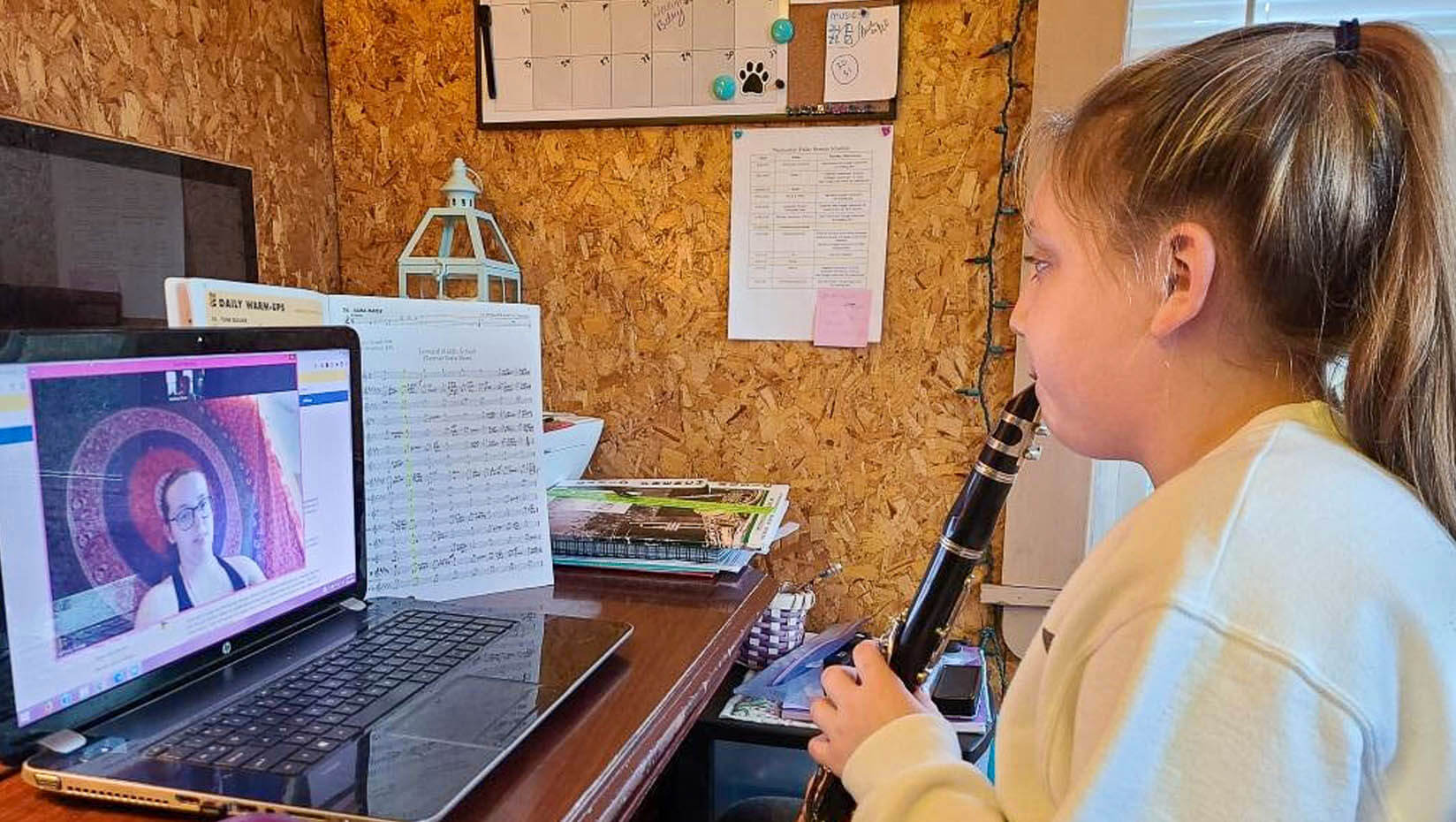
UMaine students provide music mentorship for middle schoolers
COVID-19 restrictions in Maine’s K–12 schools have transformed the way that teaching looks — particularly for the state’s many music programs. With students unable to play their instruments together in-person, music educators have had to get creative to teach their students technique from home.
That’s why Philip Edelman, assistant professor of music education at the University of Maine, and Shianne Priest, director of music at Leonard Middle School in Old Town, have teamed up to pilot a program that pairs music education majors in the UMaine School of Performing Arts with budding middle school musicians for free, private online lessons.
As part of their classes this semester, more than 30 students who enrolled in MUE 210 — Introduction to Music Education and MUE 401 — Organization and Administration of Secondary Music Performance Programs with Edelman have been partnered for music mentorship with students in grades six through eight.
The collaboration begins with each music education student indicating availability to Priest and Leonard Middle School parents; interested parents then contact students via Priest for lessons. The pilot program is beginning its third month, with most of the UMaine students acting as online music mentors for up to three students.
Each week, the UMaine students deliver their half-hour or one hour lessons via Zoom. After each lesson, the UMaine student completes an online reflection that identifies successes and challenges in each session, providing perspective on their own practice as a teacher-in-training, giving Edelman, Priest, and the students themselves the chance to consider trends over time, develop skills, and follow up on issues. Selected sessions also are recorded so that Edelman can offer clear feedback on students’ teaching practice and technique.
The collaboration is a natural fit, Edelman says. Under COVID-19 restrictions, the middle school students can’t play their instruments together in-person; UMaine music education students, in turn, aren’t able to conduct the lab ensemble component of their classes, which would normally form a central part of their music teacher preparation program in nonpandemic conditions. Many music education students also were worried about opportunities for student teaching in a pandemic.
So far, Edelman says, the program has been a great success. “In terms of service to the community and the educational element for us, this has been a real home run,” he says.
Priest says the university students are making it fun for the middle school students “during a time when music could be a real drag.”
“We can talk about theories of teaching until we’re blue in the face, but until they actually sit down with a seventh grader and say, ‘no, you have to push this button on your trumpet to make that note,’ you know, it’s impractical,” added Edelman.
Music education major Jacob LaMontagne, a sophomore in Edelman’s MUE 210 class, agrees. “The best way for my colleagues and I to learn teaching skills is to get field experience early on. I’m beyond thankful for this opportunity and I’m proud to be a part of it,” he says.
LaMontagne also notes that the middle school students are “patient, hardworking and flexible. We couldn’t have asked for better students.”
Megan Howell of Mount Desert, a double major in music education and flute performance, adds that she values the connections she’s been able to make. “The students really brighten my day, and I look forward to seeing them each week,” she says.
Howell, like LaMontagne, is thankful for the hands-on experience that she was worried the pandemic might have precluded, and for the chance to develop skills in a mode of instruction that will likely become increasingly common in the future.
Edelman says the pilot program has been invaluable for him as a music educator: students’ reflections and recorded lessons have prodded him to consider his own curriculum and his own pedagogy. In studying students’ teaching, Edelman can examine the specific kinds of situations — technical and pedagogical — that arise.
“Reviewing students’ lessons and their reflections is a great chance to challenge my own assumptions and ask what’s really important to cover in the classroom as we help our students become effective music teachers down the road,” he says.
The pilot collaboration between UMaine and Leonard Middle School continues through the fall, but Edelman hopes to see it continue into the new year and beyond: if all goes well, he would like to see it expanded to other schools and made a permanent part of UMaine music education.
Contact: Brian Jansen, brian.jansen@maine.edu
